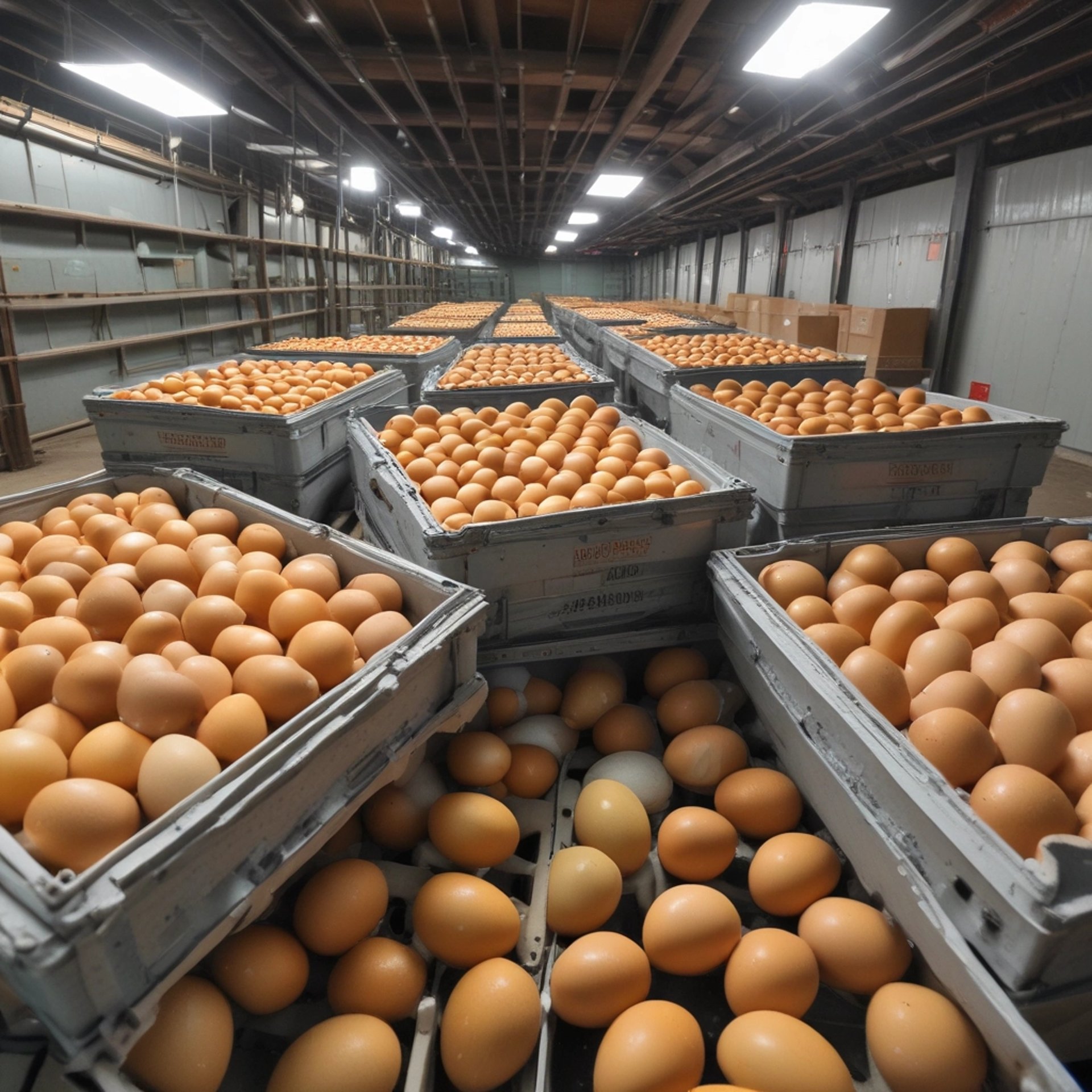Cracking the Global Market: Understanding Egg Import Export Regulations
in the global market, IndoEggs is well-versed in the intricate web of international egg trade. While specific regulations can change, here’s a high-level overview of key considerations for import and export eggs in five major markets: Australia, America (USA), Germany, singapore, and oman
6/19/20254 min read


Navigating the complexities of international egg trade is crucial for any world egg supplier. Each country presents its own unique set of regulations, from biosecurity measures and quality standards to labeling and certification requirements. Understanding these nuances is key to seamless global sourcing and successful market expansion.
As your trusted partner in the global egg market, IndoEggs is well-versed in the intricate web of international trade. While specific regulations can change, here’s a high-level overview of key considerations for importing and exporting eggs in five major markets: Australia, America (USA), Germany, Singapore, and Oman.
1. Australia: Strict Biosecurity and Import Permits
Australia maintains some of the strictest biosecurity controls globally to protect its native flora and fauna from exotic diseases. This extends significantly to the import of animal products, including eggs.
Imports: Whole eggs are generally not allowed into Australia unless accompanied by a specific import permit. The focus is on preventing the entry of diseases like Avian Influenza and Newcastle Disease. Processed egg products may have different conditions, often requiring commercial preparation, being fully cooked and shelf-stable, and originating from approved, disease-free countries. Importers must consult the Department of Agriculture, Fisheries and Forestry's (DAFF) Biosecurity Import Conditions system (BICON) for precise and up-to-date requirements.
Exports (from Australia): Australian exporters of prescribed egg products (chicken eggs or their liquid, frozen, dried, or denatured contents for human consumption) must register with DAFF as an exporter and/or an export establishment. They need to obtain valid export permits, ensure products meet importing country requirements, and provide a declaration of compliance for each shipment.
2. America (USA): Multi-Agency Oversight and Disease Status
The United States has a multi-layered regulatory framework for egg imports and exports, involving several federal agencies.
Imports:
USDA APHIS (Animal and Plant Health Inspection Service): Regulates the importation of animal products to prevent exotic animal and poultry diseases. Countries must be deemed eligible to export to the US based on their disease status (e.g., Avian Influenza).
FDA (Food and Drug Administration): Foreign producers must comply with the FDA's "Egg Rule" (21 CFR Part 118), covering production, storage, and transportation of shell eggs to prevent Salmonella Enteritidis (SE).
USDA AMS (Agricultural Marketing Service): Requires specific forms (e.g., LP-222) and foreign inspection certificates for shell eggs, along with strict labeling requirements including country of origin and refrigeration instructions.
USDA FSIS (Food Safety and Inspection Service): Responsible for inspecting egg products (liquid, frozen, dried eggs). Egg products must come from countries with inspection systems deemed equivalent to the US, and shipments undergo reinspection upon arrival. Currently, only a limited number of countries are eligible to export egg products to the US.
Exports (from USA): US egg and egg product exports must meet the importing country's specific requirements, which often include health certificates issued by USDA and adherence to international food safety standards.
3. Germany (and the EU): Rigorous Food Safety and Animal Welfare Standards
As a member of the European Union, Germany adheres to the comprehensive EU regulations for food safety, traceability, and animal welfare.
Imports:
EU Food Safety Standards: Imports must comply with strict EU regulations (e.g., Regulation (EC) No. 178/2002) ensuring eggs are free from contaminants like Salmonella and requiring HACCP systems.
Biosecurity Measures: Farms in exporting countries must follow protocols to prevent diseases like Avian Influenza.
Grading and Traceability: Imported eggs must meet EU grading (Class A or B) and weight standards (S, M, L, XL). Crucially, each egg is typically stamped with a code indicating the farming method (e.g., 0-organic, 1-free-range, 2-barn, 3-cage), country of origin, and farm ID.
Health Certification: Non-EU countries require health certification and veterinary inspections at EU entry points. Additional import duties may apply based on market prices.
Exports (from Germany): Exports within the EU benefit from the single market. Exports to non-EU countries require adherence to the importing country's specific health and certification requirements, often including veterinary certificates.
4. Singapore: Approved Sources and Farm-Level Certification
Singapore, a net importer of food, maintains a robust regulatory framework focused on food safety and security.
Imports:
Approved Sources: Singapore maintains a list of approved countries and often specific farms or establishments from which eggs and egg products can be imported. These approvals are based on food safety risk assessments and the exporting country's animal health status.
SFA Accreditation: The Singapore Food Agency (SFA) mandates accreditation for high-risk overseas food source farms and facilities, including those for eggs. Applications are submitted through the competent authority of the exporting country.
Traceability: For shell eggs, the SFA-issued farm code, unique to each approved layer establishment, must often be stamped on each egg to ensure traceability.
Health Certificates: Consignments typically require official health certificates from the exporting country's competent authority.
Exports (from Singapore): Exporters need to ensure their products meet the import requirements of the destination country. SFA provides guidance for local exporters.
5. Oman: Veterinary Permits and Halal Requirements
Oman, a member of the Gulf Cooperation Council (GCC), follows regional and national regulations for food imports, with a particular emphasis on animal health and, for some products, Halal certification.
Imports:
Veterinary Import Permit: A veterinary permit from the Omani Ministry of Agriculture, Fisheries Wealth & Water Resources (MAFWR) is essential for importing table eggs and hatcheries. This permit must be applied for before the shipment leaves the country of export and is typically valid for one month.
Health and Origin Certificates: Shipments require a Veterinary Medical Certificate and a Certificate of Origin from the exporting country's competent authority.
Quarantine: The MAFWR's quarantine section inspects imports of animals and animal products, and poultry may be subject to holding in quarantine.
Halal Certification: While primarily for meat, it's prudent to check if any specific egg products require Halal certification for the Omani market.
Exports (from Oman): Omani exporters would need to comply with the import requirements of their destination markets, including relevant health and veterinary certificates.
Partnering for Success in the Global Egg Market
The intricacies of international egg trade highlight the importance of partnering with an experienced and reliable supplier. At IndoEggs, we pride ourselves on:
Regulatory Expertise: Our team stays up-to-date with the latest import/export regulations in key markets.
Robust Supply Chain: We manage logistics, documentation, and compliance to ensure your shipments clear customs efficiently.
Quality Assurance: Our commitment to food safety and biosecurity ensures that all our products meet or exceed international standards.
Don't let complex regulations be a barrier to your global ambitions. Partner with us for hassle-free international egg procurement. Contact our logistics experts today to discuss your specific needs and unlock new markets!

Quality
Fresh eggs sourced from sustainable Indonesian farms.
indoeggs7@gmail.com
